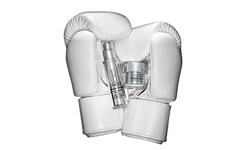Ingredient to Know
Don’t let the name fool you. Hyaluronic acid isn’t an acid in the way you may think. Unlike salicylic, glycolic, and lactic acids, hyaluronic acid doesn’t remove dead cells from your skin. On the contrary, it actually adds something absolutely vital to optimal skin health: water.
Nature’s most powerful water magnet.
This ingredient’s super power? It can hold 1,000 times its own weight in water. (That’s sort of like you holding up a whale. Crazy, right?). Hyaluronic acid is naturally present within your entire body and has the consistency of a viscous gel. It acts as a lubricant to help your joints, muscles, and nerves function smoothly. Think of it like the oil in a car engine.
So what specifically does it do for your skin? It is the supreme humectant, not only drawing vital water in to your skin, but also holding on to it and preventing moisture loss. This provides both immediate and long-term hydration benefits, so your skin can maintain a plump, hydrated, radiant, and smooth appearance.
The caulk in the leaky roof.
Hyaluronic acid also serves another key function in optimal skin health. It strengthens your moisture barrier, which is the outermost layer of your skin and your first line of defense against environmental aggressors. Think of your moisture barrier as the roof of a house. When it’s intact, it protects everything inside, but when it’s leaky, damage occurs. When your moisture barrier is intact, your skin appears and feels smooth, soft, and plump. If your moisture barrier is damaged, your skin looks dry and rough. (Think of dry skin cells flaking off your skin as a tile slipping off the roof of the house.) The more damaged your moisture barrier, the harder it is to reverse issues like dehydration, wrinkles, hyperpigmentation, and breakouts. Hyaluronic acid fills in the spaces between skin’s essential support structures, keeping your moisture barrier strong and cushioned.
Who needs hyaluronic acid?
Everyone! Your moisture barrier can be compromised daily by environmental factors like indoor heating, sun exposure, dehydration, pollution, and dirt. Additionally, your body naturally loses about one pint of water a day, which can affect your skin’s level of hydration, especially if you fall into the 75% of Americans who are chronically dehydrated. But hyaluronic acid isn’t just for dry skin, and it isn’t just for winter either. Every skin type would look its most youthful, plump, and radiant with an optimized moisture barrier. Also keep in mind that your ability to retain water and naturally produce hyaluronic acid declines as you age, which can exacerbate increased dryness, fine lines, wrinkles, and sagging. (Babies have such soft, plump skin because they have a ton of hyaluronic acid in their cute, pinchable bodies.)
Bottom line: Make sure hyaluronic acid is part of your skin care regimen.
Hyaluronic acid is a key ingredient in many moisturizers and serums and should be used day and night. But don’t be scared that this type of intense hydration has to come in a thick cream. Case in point: Clinique Moisture Surge Extended Thirst Relief, which has a lightweight gel texture. This serum-in-a-jar actually has two types of hyaluronic acid—one that works immediately on the uppermost layers of your skin, and another variant that penetrates deeper. Use it daily for immediate and long-lasting hydration, or tap it over makeup for a midday shot of extra moisture. Another hyaluronic acid superstar: Clinique Smart Broad Spectrum SPF 15 Custom-Repair Moisturizer, which is not only loaded with it, but it also helps reduce the 4 major signs of aging with its powerful blend of peptides, proteins, and antioxidants.
Illustration: Ben Wiseman








